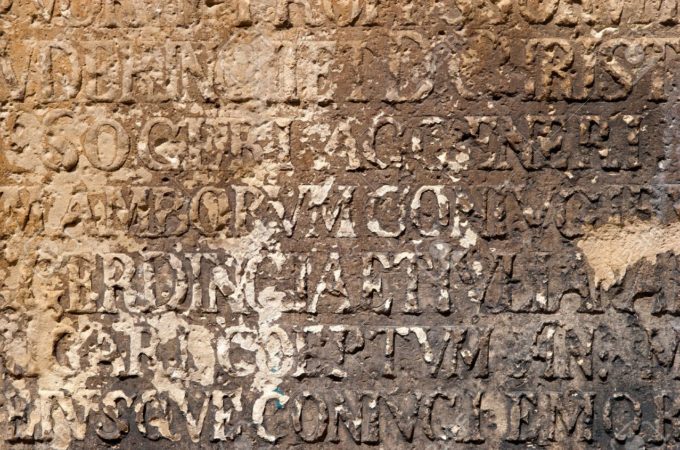Ancient Latin inscription
Answer: Martin Luther King
Question: Who said, “I have a dream that my four little children will one day live in a nation where they will not be judged by the color of their skin, but by the content of their character.”
Oh that Dr. King’s dream might spread in today’s world! Here’s a story that could help, and shatter a few stereotypes in the process. It’s the account of Boy’s Latin, an “all-black school in an iffy part of West Philadelphia,” as a recent Wall Street Journal article puts it. Every student (yes, they’re all boys) studies Latin, no matter what other subjects or extracurricular activities he pursues.
Most of us probably didn’t have enough sense to study Latin in high school. Often it wasn’t even offered. But those who do gain rich benefits in their grasp of English. The school’s web page affirms, “Through the study of Latin grammar and syntax, students master the richness of English as a language and a literature as well as gain a historical overview of how language and its structures develop and work.” They also hone their ability to employ critical thinking. Another, less anticipated gain is the common experience, and the resulting bond, of succeeding at a difficult challenge.
 Eighty percent of the graduates of Boy’s Latin go on to college or university. Compare that with the rate for all the schools in the district: 34%. Given the low matriculation of young African American men in Philadelphia, Boy’s Latin is providing leadership in the #blackdegreesmatter movement in the city.
Eighty percent of the graduates of Boy’s Latin go on to college or university. Compare that with the rate for all the schools in the district: 34%. Given the low matriculation of young African American men in Philadelphia, Boy’s Latin is providing leadership in the #blackdegreesmatter movement in the city.
The graduates of Boy’s Latin will do better in college and in life. If they marry and have children, their families, and even their neighbors, will benefit from “the content of their character.” The discipline required to study Latin is a dimension of the self-governance we’ve written about before. Contrast that discipline, and the related character development, with another teen activity, one much more common: the ubiquitous video game.
Let’s propose an experiment. Start with 24 young males (of any skin color) from low-income neighborhoods. Put them into two groups. Group one plays video games for two hours every day. Group two uses the same two hours to study Latin. What differences might appear in a year? Five years?
Multiply that by 30 million young adults and extrapolate the effect over 30 years. What effect might that have on our society?
Boy’s Latin shows what young black men are capable of if they learn to read well, to reason and think analytically, skills acquired by the study of Latin. Imagine the impact if the “black lives matter” movement was converted to “black education matters.” What if more inner city schools truly educated (rather than just “schooled”) their students? What if more schools graduated young people who were thinkers and readers, prepared for leadership in the public square and market place?
Wouldn’t that be something?
- Gary Brumbelow






